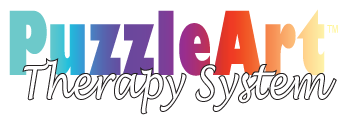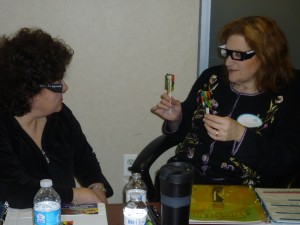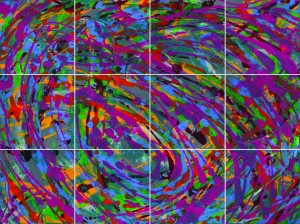Visual Skills are Child’s Play
Preschoolers spend their days building with blocks, manipulating puzzle pieces, coloring, cutting, and learning to function in their world. While to them this is all just play, their brains and eye are engaged in important work, developing the visual skills that will help them succeed in school and life.
“Play is often talked about as if it were a relief from serious learning. But for children play is serious learning. Play is really the work of childhood.”
– Fred Rogers
At this unique point in child development, opportunities for growth and learning abound at every turn, and children ages 2 to 5 are fine-tuning the visual skills they developed from birth through toddlerhood, strengthening their focus, tracking, and depth perception skills.

During this time, a child's visual perceptual skills are maturing to help them progress through a variety of childhood milestones. Preschoolers develop complex hand-eye coordination in order to learn to ride a balance bike or scooter while steering and watching where they're going. They must coordinate gross motor skills and visual skills in order to play a sport such as soccer, and they must develop the visual perceptual abilities and fine motor skills necessary for reading and writing readiness.
While most children develop along the path of visual ability without issue, the preschool years present a critical point where vision problems occur. Prevent Blindness tells us that 1 out of 20 preschoolers have a vision problem.
 This is the time in vision development where conditions such as strabismus (crossed eyes, where one or both eyes turns inward or outward), amblyopia or lazy eye (characterized by reduced vision in one eye because the eyes and brain are not working well together), or refractive errors (such as nearsightedness or farsightedness) develop. Those conditions – amblyopia, strabismus, and refractive error – account for the most prevalent visual disorders in the preschool demographic, and all impact the development of visual skills.
This is the time in vision development where conditions such as strabismus (crossed eyes, where one or both eyes turns inward or outward), amblyopia or lazy eye (characterized by reduced vision in one eye because the eyes and brain are not working well together), or refractive errors (such as nearsightedness or farsightedness) develop. Those conditions – amblyopia, strabismus, and refractive error – account for the most prevalent visual disorders in the preschool demographic, and all impact the development of visual skills.
In order to provide preschool-aged children with a solid foundation, we must take steps to ensure normal visual abilities are developing so that their pre-reading skills leave them ready for reading and learning in school. Children will need matching skills, which requires visual discrimination; directionality, which incorporates a visual understanding of left to right and top-to-bottom; and letter-recognition skills, which involves visual processing and memory.
The American Public Heath Association recognizes the importance of children's vision and need for visual skills, and has therefore crafted a resolution that addresses “vision screening with follow-up programs and/or vision examinations for all children prior to entry into school.”
One challenging piece of the puzzle is that children often do not notice there's a problem nor do they complain. Without a larger frame of reference, they assume this is how everyone sees and navigates the world. Any delays in development must be noted, as they may signal the presence of a vision problem and therefore, delays in the development of visual skills.
If a child is having difficulty recognizing colors, shapes, or letters, they may in fact be experiencing a visual problem rather than a learning issue. Clearly, the stakes here are high: if a child is experiencing visual problems that are not addressed, he or she may enter the school system displaying developmental delays that could find that child labeled with a learning disability. This label and potential interventions would not solve the root of the problem and could add layers of other issues, such as social stigma and lowered self-esteem.
Warning Signs of Visual Problems
- Sitting too close to the TV or holding a book too close to their face
- Squinting
- Tilting their head to see better
- Frequently rubbing their eyes, even if they aren't tired
- Sensitivity to light
- Difficulty with eye-hand-body coordination when playing ball or bike riding
- Avoiding coloring activities, puzzles and other detailed activities
Behavioral and developmental vision care can play an important role in correcting the visual deficits of a preschool-aged child. While glasses and vision correction may be one piece of the puzzle, vision therapy can prove just as important.
PuzzleArt Therapy provides fun and engaging tools and activities that strengthen over 20 skills, including ones that aid in reading-readiness and address the most common visual problems the preschool set face, including:
- Amblyopia
- Near/Far Focus
- Binocular Skills
- Bilateral Integration
- Letter + Word Recognition
- Directionality
- Gross + Fine Motor Skills
- Visualization
When you're three, learning about the world is your main job in life. Since we all take in 80% of that world through our eyes, it is vital that any visual problems have been identified, and that the growing visual skills of the young child are properly stimulated and trained in order to help the eyes and brain communicate as effectively as possible.
Alli Berman is a Brain Fitness expert and the Eye Brain Fitness Guru. She has been an artist, author, educator, creativity consultant, workshop leader, perceptual and sensory products and programs developer, and motivational speaker for the past 30+ years. Berman has served as an educational advisor to the American Academy for Anti-Aging Medicine for over 30 years, and she is the founder of The Art of Rehabilitation and Anti-Aging Art. She created the PuzzleArt Therapy System in collaboration with behavioral optometrist, Susan Fisher, OD, and through consultation with neuroscientists around the world. Berman uses the system herself on a daily basis to keep her own brain as healthy, engaged, and challenged as possible!



